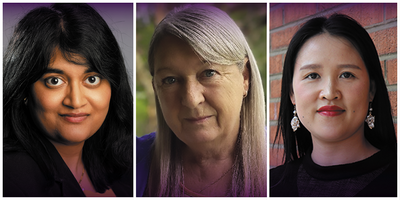
Meet Dr Sonali Gnanenthiran, Research Fellow in the Cardiovascular Program
Sonali’s journey to cardiology was inspired by a very personal experience; when she was young, her father’s experience after a heart attack drove a desire to improve how cardiac patients and their families are treated in hospitals. Now a practising cardiologist at Concord Hospital in Sydney, Sonali is an award-winning researcher for her work in heart blockages. A combination of perfect timing and ideal opportunity in clinical trial research led her to The George Institute.
What first attracted you to cardiology?
My father had a heart attack when I was ten years old. I saw things from the patient side, including when things were not always managed appropriately. I wanted to provide the type of care that I wished that my father had received and make a difference to families like mine.
How does being both a clinician and a researcher work?
They’re complementary - my clinical experiences help me develop clinically relevant research questions and the research helps me make evidence-based clinical decisions. As a clinician, I have the ability to make changes at an individual level. As a researcher there is potential to make a much broader impact. If a study is successful, this helps us to translate the results into guidelines and policy.
You were one of only three recipients globally to receive a 2023 Early Career Investigator Award from the Atherosclerosis, Thrombosis, and Vascular Biology (ATVB) journal. Why is this critical in cardiology?
ATVB is an area of research that looks at the processes leading to heart blockages. It’s essential to developing new approaches and understanding why treatments work in some people but not others. Platelets are key in preventing blood clotting and we looked at how platelet activity changes with ageing. These changes correlate with inflammation and generation of thrombin, which also affects clotting. By targeting these age-related changes, we may be better able to prevent heart attacks and strokes in older people who experience the majority of cardiovascular disease.
Sex and gender equity in health and medicine is a priority at The George Institute - how is this relevant in cardiology?
The sex and gender imbalance can adversely affect both doctors and patients. The George is explicitly working to address this.
When we consider female cardiovascular patients and their needs specifically, they often present with different symptoms to men, which the evidence shows often leads to delayed or misdiagnoses, or their condition going unrecognised. This of course has serious implications for their outcomes.
Women may also not receive the care they desire in the current medical system, as they often prefer a female doctor, so the overall experience and outcomes can be less than optimal.
On the professional side, there are very few female cardiologists appointed at public hospitals, because this generally requires a PhD and fellowship. For women juggling long and intense work hours with family responsibilities, this can be incredibly challenging. It can also make it difficult to form networks within the cardiology community, which can affect women’s career progression.
What was it about The George that caught your attention?
Perfect timing and the ideal opportunity! I’d just completed my PhD, involving basic science and epidemiological research. The George was looking for clinician researchers and was offering exciting opportunities for clinical trial research, which I had long wanted to be involved in.
What is different about The George?
It’s not always easy to find networks where you fit in, especially being a female working in basic science, clinical trials, and clinical medicine. I never had a female cardiologist mentor, but I had some amazing male mentors. I decided that I needed to become the female mentor that I never had in order to support other females coming through. The George not only provides those opportunities but encourages them. I enjoy being involved in the leadership and development of large-scale clinical trials and our team has been fortunate in receiving funding for several projects recently.
What is your current research focus?
I’m working on improving the management of high blood pressure. We’re involved in a range of clinical trials from polypill studies to population screening in retail stores to cuffless devices. I’ve recently received an early career researcher grant from NSW Health for a trial to reduce blood pressure in people after a stroke, which is a key focus at the moment for me - along with a love of baking, watching cricket, and reading fantasy novels!




